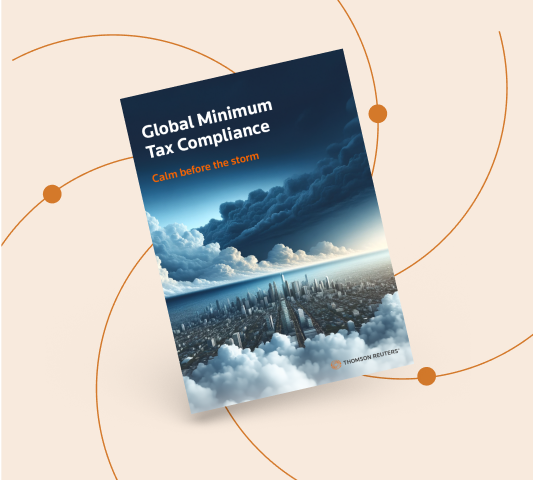Orbitax Global Minimum Tax
Are you ready for the Global Minimum Corporate Tax imperative?
Learn how Orbitax GMT, utilising its powerful database of 190+ countries, automates data collection, top-up tax calculations, compliance and forecasting for global minimum corporate tax.
Manage data effortlessly
Collect data across various formats via 90+ out of the box connectors. Data survey and other powerful data collection methods that ensure your team manages data efficiently!
Simplify calculations
Automatically calculate global minimum top-up tax, using prebuilt country specific calculators for QDMTT, IIR, UTPR and STTR, concurrently and in accurate sequence.
Efficiently comply globally
File faster in all tax jurisdictions for GloBE Information Return, and other supplemental returns like Germany Group Carrier Notification Form and others, as applicable.
Track the latest tax rules
Reduce research time and stay current on all jurisdictions' rules across data points, effective dates, and calculation rules, including deviation from the OECD rules.
Streamline taxes with accuracy and compliance
Safe harbour eligibility and readiness assessment report
Quickly identify jurisdictions that are exempt under Safe harbour rules of OECD Pillar 2, using pre-defined logic
Smart data input templates and API connectors
Load entity, transaction, and other financial data from any source in any format via four different methods into the six pre-built input templates.
In-built country specific calculators
Quickly determine effective tax rates and top-up tax liability for jurisdictions your organisation operates in using built-in country-specific calculators.
Multi-year global tax forecasting
Perform multi-year forecast calculations by expanding base-year input with growth assumptions and other input changes and further analyse data using built-in dashboards.
Predefined formats for GIR and supplementary returns
Generate and e-file GloBE Information Returns (GIR) or other tax forms, as applicable, in relevant jurisdictions that have Pillar 2 filing obligations
Comprehensive Pillar 2 library
Use material related to Pillar 2 rules issued by OECD, country specific laws, EU directive that are embedded in the solution to keep yourself up to date.
Talk to an expert
Simplify your compliance process while maximising efficiency through Orbitax Global Minimum Tax!
What do our customers think?

I like that Orbitax (GMT) offers one solution for reporting and planning requirements because we are typically used to different solutions for reporting and compliance that may not always talk to each other.
Bethany Walker, Senior Tax Manager - Pyxus International
Featured resources
Leveraging the Orbitax GMT solution for BEPS Pillar Two in a co-sourced model
Global Minimum Tax compliance: The calm before the storm
Preparing, provisioning and compliance readiness for BEPs 2.0
Frequently asked questions
The global minimum tax is a tax reform initiative aimed at ensuring that multinational companies pay a baseline tax regardless of which country they operate from. This is important because it addresses tax avoidance strategies that exploit differences in tax systems, leading to a fairer distribution of tax revenues globally. For multinational companies, understanding and complying with BEPS 2.0 is crucial to avoid penalties and maintain a good corporate reputation. By ensuring compliance, companies can also avoid financial risks associated with tax audits and legal disputes. It encourages transparency and helps in strategic tax planning, ensuring that the company’s operations are sustainable and aligned with international standards.
Companies can prepare for Pillar 2 by first understanding the specific requirements and implications of the tax for their business. This involves analysing their current tax structures and identifying areas that may be impacted by the new rules. Implementing robust tax compliance systems and processes is essential to ensure accurate reporting and payment. Companies should consider investing in technology solutions that automate tax calculations and reporting, reducing the risk of errors and ensuring timely compliance. Additionally, consulting with tax experts can provide valuable insights and strategies tailored to the company's unique situation. Preparing for the global minimum tax also involves engaging with stakeholders, including employees and investors, to communicate the company's approach and the benefits of compliance. By taking proactive steps, companies can navigate the complexities of the global minimum corporate tax effectively, maintaining their competitiveness in the global market.
Companies might encounter several challenges when implementing pillar 2, including understanding complex international tax regulations and aligning them with local laws. The administrative burden of collecting and analysing tax data from various jurisdictions can be significant. Companies may also need to invest in new technology and systems to automate compliance processes and ensure accurate reporting. Additionally, keeping up with ongoing changes in global tax policies requires continuous monitoring and adaptation. Engaging with experienced tax advisors and investing in compliance solutions can help companies overcome these challenges effectively.
GMT will be effective from 2024, with 139 countries agreeing to implement it. As more countries implement these laws with varying dates and deviations, complexities will increase, requiring updates to data collection and calculation processes. An end-to-end automation process for GMT is essential to manage these changes and future-proof the process. Adequate documentation and audit trails are crucial, making Orbitax GMT a preferred choice.
139 countries have agreed to implement Pillar Two rules. Many countries have already implemented the rules in their domestic laws. The rules require only one country where you conduct business to implement them. This means that multinational enterprises (MNEs), even those headquartered in a country where GMT has not been implemented yet, will still need to comply if they operate out of country(ies) wherein pillar 2 has been enacted.
The global minimum tax can potentially increase an organisation's Effective Tax Rate (ETR) by imposing a baseline tax rate that may be higher than what is currently paid in low-tax jurisdictions. To mitigate these risks, organisations should conduct a thorough review of their tax structures and identify areas where the ETR might be impacted. Implementing strategic tax planning, such as optimising operational efficiencies and considering tax credits or incentives available in various jurisdictions, can help manage the ETR. Additionally, leveraging technology and expert tax advisory services can enhance compliance and reduce risks associated with the global minimum tax.
Related products
Tax Provision
Automate tax provisioning with accurate estimates using intelligent data filtering and drill down capabilities so you can file earlier and close faster.
BEPS Action Manager
Trusted solution aligned to OECD BEPS framework, that will help you take control of your OECD reporting requirements, including Local File and Country by Country (CbC) reporting
Statutory Reporting
Global disclosure management tool that includes local language, best practice, country-specific reporting templates, and content updates from the largest accounting firms.
Experience it for yourself
Simplify your compliance process while maximising efficiency through Orbitax Global Minimum Tax!
Have questions? Contact a representative



